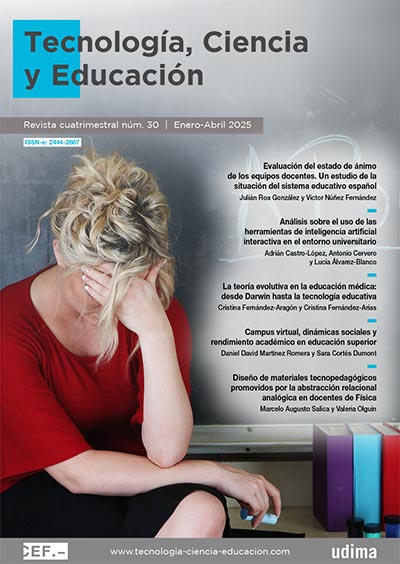Assessment of the mood of teaching staff. A study of the Spanish educational system situation
DOI:
https://doi.org/10.51302/tce.2025.22235Keywords:
emotional well-being, mental health, pandemic, teacher stress, mood, depression, psychological well-beingAbstract
The study addresses the mental health and mood of teachers (men and women) in Spain. It emphasizes the importance of the emotional and psychological well-being of the teaching staff, which are crucial for educational performance and the classroom environment. A self-report questionnaire was distributed to 3,790 teachers, covering various contextual and demographic variables that were collected in 58 questions, including the PHQ-9 test. The methodology included non-probabilistic sampling, and descriptive statistical analysis was performed using SPSS statistical software (v.23). The results indicate that a significant percentage of teachers experience moderate to severe levels of depression, perceived mistreatment, and negative mood, exacerbated by the pandemic. The variables studied in this work that have a moderate influence on mood include age, gender, type of center, teaching experience, and educational stage. The study concludes that teachers' mental health is a priority that requires urgent attention. It suggests the implementation of psychological support programs and the improvement of working conditions. Recognizing the significant impact of external factors on teacher well-being is crucial for effective educational policies.
Downloads
References
Bisquerra Alzina, R. (2000). Educación emocional y bienestar. Praxis.
Chan, D. W. (2008). Emotional intelligence, self-efficacy, and coping among Chinese prospective and in-service teachers in Hong Kong. Educational Psychology, 28, 397-408.
Cifre, E., Llorens, S., Salanova, M. y Martínez, I. M. (2003). Salud psicosocial en profesores: repercusiones para la mejora en la gestión de los recursos humanos. Revista de Trabajo y Seguridad Social, 247, 153-168. https://doi.org/10.51302/rtss.2003.8711
Di Fabio, A. y Palazzeschi, L. (2008). Emotional intelligence and self-efficacy in a sample of Italian high school teachers. Social Behavior and Personality, 36, 315-325. https://doi.org/10.2224/sbp.2008.36.3.315
Durán Durán, M.ª A., Extremera, N., Montalbán, F. M. y Rey, L. (2005). Engagement y burnout en el ámbito docente: análisis de sus relaciones con la satisfacción laboral y vital en una muestra de profesores. Revista de Psicología del Trabajo y las Organizaciones, 21, 145-158.
Esteras, J., Chorot, P. y Sandín, B. (2014). Predicción del burnout en los docentes: papel de los factores organizacionales, personales y sociodemográficos. Revista de Psicopatología y Psicología Clínica, 19(2), 79-92. https://doi.org/10.5944/rppc.vol.19.num.2.2014.13059
Gómez-Domínguez, V., Gómez-Domínguez, T., Navarro-Mateu, D. y Giménez-Espert, M.ª C. (2022). The influence of COVID-19 and psychosocial risks on burnout and psychosomatic health problems in non-university teachers in Spain during the peak of the pandemic regressions vs. fsQCA. Sustainability, 14(20), 1-15. https://doi.org/10.3390/su142013030
González-Sanguino, C., Ausín, B., Castellanos, M. Á., Saiz, J., López-Gómez, A., Ugidos, C. y Muñoz, M. (2020). Mental health consequences during the initial stage of the 2020 coronavirus pandemic (COVID-19) in Spain. Brain, Behavior, and Immunity, 87, 172-176. https://doi.org/10.1016/j.bbi.2020.05.040
Hernández Oñativia, X. (2018). Análisis del burnout y engagement en docentes: un estudio diario (Tesis doctoral). Universidad Complutense, Facultad de Psicología.
Jennings, P. A. y Greenberg, M. T. (2009). The prosocial classroom: teacher social and emotional competence in relation to student and classroom outcomes. Review of Educational Research, 79, 491-525. https://doi.org/10.3102/0034654308325693
Mérida-López, S., Sánchez-Gómez, M. y Extremera, N. (2020). Leaving the teaching profession: examining the role of social support, engagement and emotional intelligence in teachers' intentions to quit. Psychosocial Intervention, 29(3), 141-151. https://doi.org/10.5093/pi2020a10
Moriana, J. A. y Herruzo, J. (2004). Estrés y burnout en profesores. International Journal of Clinical and Health Psychology, 4, 597-621.
OMS. (2022). Informe mundial sobre salud mental. https://www.who.int/es/publications/i/item/9789240050860
Rodríguez-Rey, R., Garrido-Hernansaiz, H. y Collado, S. (2020). Psychological impact and associated factors during the initial stage of the coronavirus (COVID-19) pandemic among the general population in Spain. Frontiers in Psychology, 11, 1-23. https://doi.org/10.3389/fpsyg.2020.01540
Salanova, M., Llorens, S. y García-Renedo, M. (2003). ¿Por qué se están «quemando» los profesores? Prevención, Trabajo y Salud, 28, 16-20.
Sánchez-Pujalte, L., Navarro Mateu, D., Etchezahar, E. y Gómez Yepes, T. (2021). Teachers' burnout during COVID-19 pandemic in Spain: trait emotional intelligence and socioemotional competencies. Sustainability, 13, 1-11. https://doi.org/10.3390/su13137259
Schoeps, K., Tamarit, A., Barrera, U. de la y González Barrón, R. (2019). Efectos del entrenamiento de habilidades emocionales para prevenir el síndrome de burnout en docentes escolares. Ansiedad y Estrés, 25(1), 7-13. https://doi.org/10.1016/j.anyes.2019.01.002
Sutton, R. E. y Wheatley, K. F. (2003). Teacher's emotions and teaching: a review of the literature and directions for future research. Educational Psychology Review, 15, 327-358. https://doi.org/10.1023/A:1026131715856
Tang, C., Au, W., Schwarzer, R. y Schmitz, G. (2001). Mental health outcomes of job stress among Chinese teachers: role of stress resource factors and burnout. Journal of Organizational Behavior, 22, 887-901.
Uitto, M., Jokikokko, K. y Estola, E. (2015). Virtual special issue on teachers and emotions in Teaching and teacher education (TATE) in 1985-2014. Teaching and Teacher Education, 50, 124-135. https://doi.org/10.1016/j.tate.2015.05.008
Downloads
Published
How to Cite
Issue
Section
License
Copyright (c) 2024 Julián Roa González, Víctor Núñez Fernández

This work is licensed under a Creative Commons Attribution-NonCommercial-NoDerivatives 4.0 International License.


























